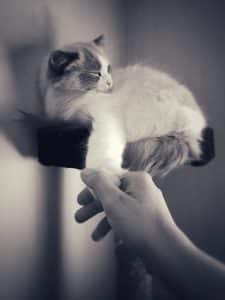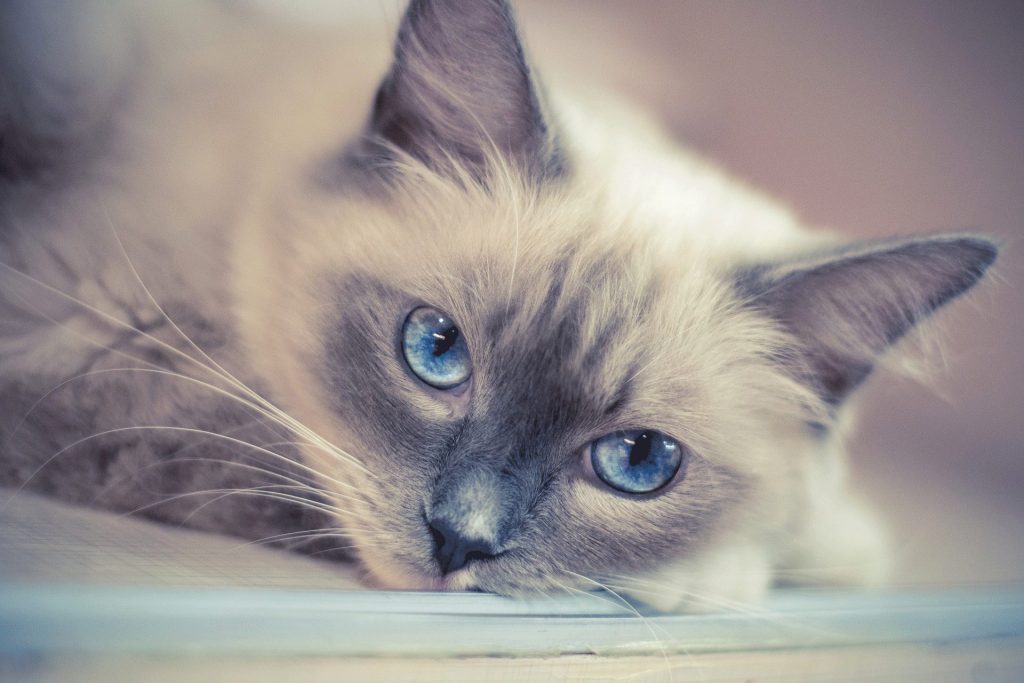Like all purebreds, Ragdolls do have their share of health issues associated with their breed. To be fair, some health issues they experience are common to all cats, but should you should still be aware of these so you can prevent or detect any unusual health issues with your Ragdoll sooner.
Nobody ever wants anything bad to happen to their lovable Ragdoll, but staying informed can help you make good decisions and help your Ragdoll live a long and happy life!
Inbreeding with Ragdoll Cats
In order to keep the physical characteristics and personality we love so much in the Ragdoll, breeders will often inbreed them. This means that the breeder will mate a Ragdoll with another Ragdoll that is a close relative, and therefore closely related genetically.
About 45% of a Ragdoll’s genes come from a single Ragdoll named “Daddy Warbucks”, so you can see how closely related they all are genetically. This can cause problems, though, because without genetic diversity Ragdolls are more prone to hereditary diseases that can cause a lower life expectancy.
This doesn’t necessarily mean your Ragdoll is doomed; many catteries do the best they can to mate Ragdolls from other catteries or geographic locations. The breeder might also take measures to snuff out bad lineages by not continuing to breed Ragdolls that seem to have litters with excessive problems.
Common Health Issues for Ragdolls
Obesity in Ragdolls
Obesity isn’t just specific to Ragdolls; a lot of domestic house cats are at risk of becoming obese if they are fed too much and not given enough physical activity.
However, Ragdolls in particular are known for their gentle, laid back nature. They’re more relaxed and not as active as other breeds, which increases their risk of becoming obese. To make matters worse, their silky, fluffy coat can oftentimes hide excess weight, so it might not be apparent that they’re gaining weight.
It’s important that you keep a close eye on your Ragdoll’s diet and incentivize exercise with toys and playtime. Your vet should be able to give great recommendations for how to do all of this.
Urinary Tract Infections in Ragdolls
Urinary tract infections are one of the most common diseases for Ragdoll cats. These include:
- Urinary Tract Infection
- Cystitis
- Feline Lower Urinary Tract Disease
Your Ragdoll will likely exhibit symptoms if they have a urinary tract infection, which might include:
- Constant desire to urinate, but difficulty to do so
- Pain when urinating
- Blood in urine
- Urinating outside the litter box
- Excessive licking of the genitals
If you notice your Ragdoll doing any of these things, it might be a good idea to have a vet check up on them.
Hypertrophic Cardiomyopathy (HCM) in Ragdolls
Hypertrophic Cardiomyopathy is a fairly common heart condition found in domestic cats, but is a particular problem for the Ragdoll. With this disease, the heart muscle becomes abnormally thick, making it harder for the heart to pump blood to the rest of the body.
This poor circulation can cause other problems such as thromboembolism, or the formation of blood clots.
This disease is most common in older male Ragdolls and although symptoms are usually subtle or non-apparent, they could include:
- Vomiting
- Difficulty breathing
- Appetite loss
- Weightloss
- Fatigue or lethargy
- Weakness of rear limbs
- Sudden death
Hairballs in Ragdolls
Like most semi-longhair or longhair cats, Ragdoll’s will groom themselves and develop hairballs in their digestive system. While this is a completely normal process and helps keep them clean and well-groomed, it can occasionally cause problems if they cannot “expunge” (or get rid of) the hairball properly. Some symptoms of this include:
- Vomiting liquid and food
- Frequent gagging
- Apathy (lack of enthusiasm)
- General feelings of discomfort or illness
- Regurgitation without expunging anything
You can help your Ragdoll avoid a lot of these hairball issues by brushing them frequently.
Polycystic Kidney Disease in Ragdolls
Polycystic disease is one example of a hereditary disease that comes from inbreeding Ragdoll cats. This disease involves cysts (a sack-like pocket filled with air or fluid) that grow on the kidneys. This can eventually lead to kidney damage or failure over time as the cysts often grow.
Some symptoms of this might include:
- Weightloss
- Weakness
- Loss of appetite
- Lethargy and lack of energy
- Excessive drinking
- Frequent urination
Breeders will usually do what they can do prevent having litters of Ragdolls with Polycystic Kidney Disease which includes sterilizing cats that produce litters with this disease.
Veterinary Checkups

While it’s important to stay informed on the symptoms and issues related to these diseases, it’s even more important to schedule regular veterinary checkups as they can catch issues you would not have been able to detect, and potentially while still treatable. Checkups every 6-12months is advised, or potentially more frequently if your Ragdoll has known health issues.
Any strange behavior from your Ragdoll might warrant a visit to the veterinary clinic. It’s better to be safe than sorry!














